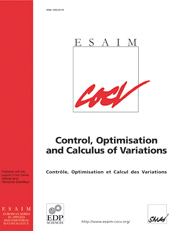Article contents
L∞ -Norm minimal control of the wave equation: on the weakness of the bang-bang principle
Published online by Cambridge University Press: 20 March 2008
Abstract
For optimal control problems with ordinarydifferential equations where the $L^\infty$  -norm of the control isminimized, often bang-bang principles hold. For systems that aregoverned by a hyperbolic partial differential equation, thesituation is different:even if a weak form of the bang-bang principle still holds for the wave equation,it implies no restriction on the form of the optimal control.To illustrate thatfor the Dirichlet boundary control of the wave equation in general not even feasible controlsof bang-bang type exist,we examine the states that can be reached by bang-bang-offcontrols, that is controls that are allowed to attain only threevalues: Their maximum and minimum values and the value zero.We show that for certain control times,the difference between the initial and the terminal state can onlyattain a finite number of values.For the problems of optimal exact and approximate boundary control of the wave equationwhere the $L^\infty$
-norm of the control isminimized, often bang-bang principles hold. For systems that aregoverned by a hyperbolic partial differential equation, thesituation is different:even if a weak form of the bang-bang principle still holds for the wave equation,it implies no restriction on the form of the optimal control.To illustrate thatfor the Dirichlet boundary control of the wave equation in general not even feasible controlsof bang-bang type exist,we examine the states that can be reached by bang-bang-offcontrols, that is controls that are allowed to attain only threevalues: Their maximum and minimum values and the value zero.We show that for certain control times,the difference between the initial and the terminal state can onlyattain a finite number of values.For the problems of optimal exact and approximate boundary control of the wave equationwhere the $L^\infty$  -norm of the control is minimized, we introduce dual problems and present the weak form of a bang-bangprinciple, that states that the values of $L^\infty$
-norm of the control is minimized, we introduce dual problems and present the weak form of a bang-bangprinciple, that states that the values of $L^\infty$  -norm minimalcontrols are constrained by the sign of the dual solutions. Sincethese dual solutions are in general given as measures, thisis no restriction on the form of the control function:the dual solution may have a finite support, and when the dual solution vanishes,the control is allowed to attain all values from the intervalbetween the two extremal control values.
-norm minimalcontrols are constrained by the sign of the dual solutions. Sincethese dual solutions are in general given as measures, thisis no restriction on the form of the control function:the dual solution may have a finite support, and when the dual solution vanishes,the control is allowed to attain all values from the intervalbetween the two extremal control values.
Keywords
- Type
- Research Article
- Information
- ESAIM: Control, Optimisation and Calculus of Variations , Volume 14 , Issue 2 , April 2008 , pp. 254 - 283
- Copyright
- © EDP Sciences, SMAI, 2008
References
- 29
- Cited by


